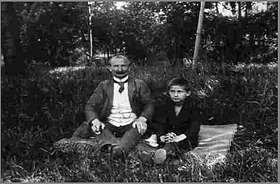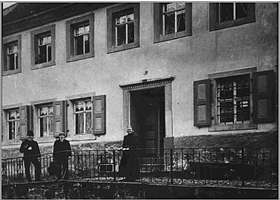| Aktualisiert am 25-Aug-2004 | |
| Deutsche Version | |
| Anzeigen | |
|
|||
Paul Guenther - His early years Visitors to the Public Library in Geithain, Germany, have certainly noticed it long ago: The view from the upper floor windows over the little park between Leipzigerstrasse and Nicolaistrasse with church and towngate beyond, is one of the most romantic views imaginable. Not just in May with the magnolias in bloom, or in the morning, when the sun bathes the lower town in light, but always. Here, in the house Leipzigerstrasse 23, Paul Guenther was born early on the morning of May 13, 1860.
The neighbourhood in which Paul Guenther grew up was lively idyllic: The town gate was close, and outside the gate a large pond, the "Hospitalteich" was a wonderful place for childish games. In the other direction from his home, a war memorial was erected after the victorious Frances- Prussian- war of 1871/72. By that time Paul was 12 years old. Even more exciting was the building of the railway from Leipzig to Chemnitz. Geithain got a station on the "Pflanzberg" far to the north of the town, and a new street, the "Bahnhofstrasse", crossed a swamp by way of a dam, to join the station with the town to the south. A whole new suburb came into existence around the new railway station. Eventually, in 1877, a new school on the "Bahnhofstrasse" replaced the small two classroom- school of 1847. This school in turn was replaced a good forty years later, by a much more magnificent building donated by Paul Guenther, who had become wealthy in Dover/ New Jersey in the United States of America.
But, for the time being, Paul Guenther learned the craft of his father, he became a weaver. Now it was around the city of Chemnitz where the factories for textiles and textile machines offered work to a growing population. That is where Paul Guenther was send after his confirmation. He entered the "School for Weavers" at Limbach. After his school years and apprenticeship came to an end he worked in various textile factories in Chemnitz and seems to have been difficult and rebellious young man. He seldom visited Geithain, and what the people of his hometown thought of him at that stage in his life, is best expressed with the sentence: "Aus dem wird nichts!" [Nothing good will become of him!"] But the proved them all wrong! In 1890 he emigrated to America. He had some very hard years ahead of him, but eventually he established himself in Dover as first manufacturer of full fashion silk stockings and became very wealthy. Dover is familiar with the story of the remarkable American. The great new school, he gave to his hometown Geithain after World War I, was opened in 1925. Excerpt of "Geithain Journal" by Gottfried Senf (senfg@aol.com) Translated by John Sommer, Georgetown, Ontario
|
|||
|
|||

